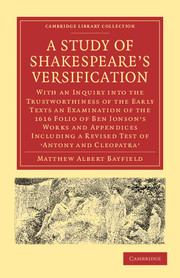 A Study of Shakespeare's Versification
A Study of Shakespeare's Versification Book contents
- Frontmatter
- PREFACE
- Contents
- ERRATA
- I SHAKESPEARE'S VERSIFICATION
- II THE EARLY TEXTS
- CHAPTER III ABOLITION OF RESOLUTIONS AND OTHER ABBREVIATIONS IN THE VERSE: Richard II and Richard III examined
- CHAPTER IV ABBREVIATIONS IN THE VERSE (continued): the Quarto Plays Hamlet, Othello, and Lear examined
- CHAPTER V ABBREVIATIONS IN THE VERSE (continued): the Folio Plays Macbeth, The Tempest, Cymbeline, Coriolanus, Antony and Cleopatra and Julius Caesar examined (Macb. p. 140, Temp. p. 154, Cymb. p. 160, Cor. p. 184, A. and C. p. 204, J. C. p. 226)
- CHAPTER VI ELISION IN THE FINAL FOOT
- CHAPTER VII ON CERTAIN SPELLINGS
- CHAPTER VIII ABBREVIATIONS IN THE PROSE
- CHAPTER IX CONCLUSIONS
- APPENDICES
- THE TRAGEDY OF ANTONY AND CLEOPATRA
- INDEX
CHAPTER V - ABBREVIATIONS IN THE VERSE (continued): the Folio Plays Macbeth, The Tempest, Cymbeline, Coriolanus, Antony and Cleopatra and Julius Caesar examined (Macb. p. 140, Temp. p. 154, Cymb. p. 160, Cor. p. 184, A. and C. p. 204, J. C. p. 226)
from II - THE EARLY TEXTS
Published online by Cambridge University Press: 01 June 2011
- Frontmatter
- PREFACE
- Contents
- ERRATA
- I SHAKESPEARE'S VERSIFICATION
- II THE EARLY TEXTS
- CHAPTER III ABOLITION OF RESOLUTIONS AND OTHER ABBREVIATIONS IN THE VERSE: Richard II and Richard III examined
- CHAPTER IV ABBREVIATIONS IN THE VERSE (continued): the Quarto Plays Hamlet, Othello, and Lear examined
- CHAPTER V ABBREVIATIONS IN THE VERSE (continued): the Folio Plays Macbeth, The Tempest, Cymbeline, Coriolanus, Antony and Cleopatra and Julius Caesar examined (Macb. p. 140, Temp. p. 154, Cymb. p. 160, Cor. p. 184, A. and C. p. 204, J. C. p. 226)
- CHAPTER VI ELISION IN THE FINAL FOOT
- CHAPTER VII ON CERTAIN SPELLINGS
- CHAPTER VIII ABBREVIATIONS IN THE PROSE
- CHAPTER IX CONCLUSIONS
- APPENDICES
- THE TRAGEDY OF ANTONY AND CLEOPATRA
- INDEX
Summary
Our examination of the five Quarto plays Richard II, Richard III, Hamlet, Othello, King Lear has revealed the fact that the Quartos and the Folio are continually contradicting one another in the matter of abbreviations made for the purpose of abolishing resolutions. Sometimes the Quarto is the offender, sometimes the Folio. We had three criteria by which to decide which was right in each case: (1) false metre, (2) false stressing, (3) our knowledge of certain characteristics of Shakespeare's dramatic verse. We also knew before we started that the Quartos of Hamlet, Othello, and Lear were on general grounds regarded by scholars as inferior to those of Richard II and Richard III. Only a selection of abbreviations from the former three was given, but my complete analysis shows that in every Quarto play the Folio abbreviates wrongly oftener than the Quarto (see Table I, p. 94), even when the Quarto is one generally classed as inferior. For the six Folio plays of which a partial analysis is given in the present chapter, we have no longer the assistance of a Quarto, but we can proceed with hardly less confidence. We have still our three criteria, and our reliance on the third of them has been greatly strengthened by the concurrent testimony of the Quartos as a class. We shall find that the Folio fully maintains its character for untrustworthiness in the matter of abbreviations.
- Type
- Chapter
- Information
- A Study of Shakespeare's VersificationWith an Inquiry into the Trustworthiness of the Early Texts an Examination of the 1616 Folio of Ben Jonson's Works and Appendices including a Revised Test of 'Antony and Cleopatra', pp. 139 - 234Publisher: Cambridge University PressPrint publication year: 2009First published in: 1920


